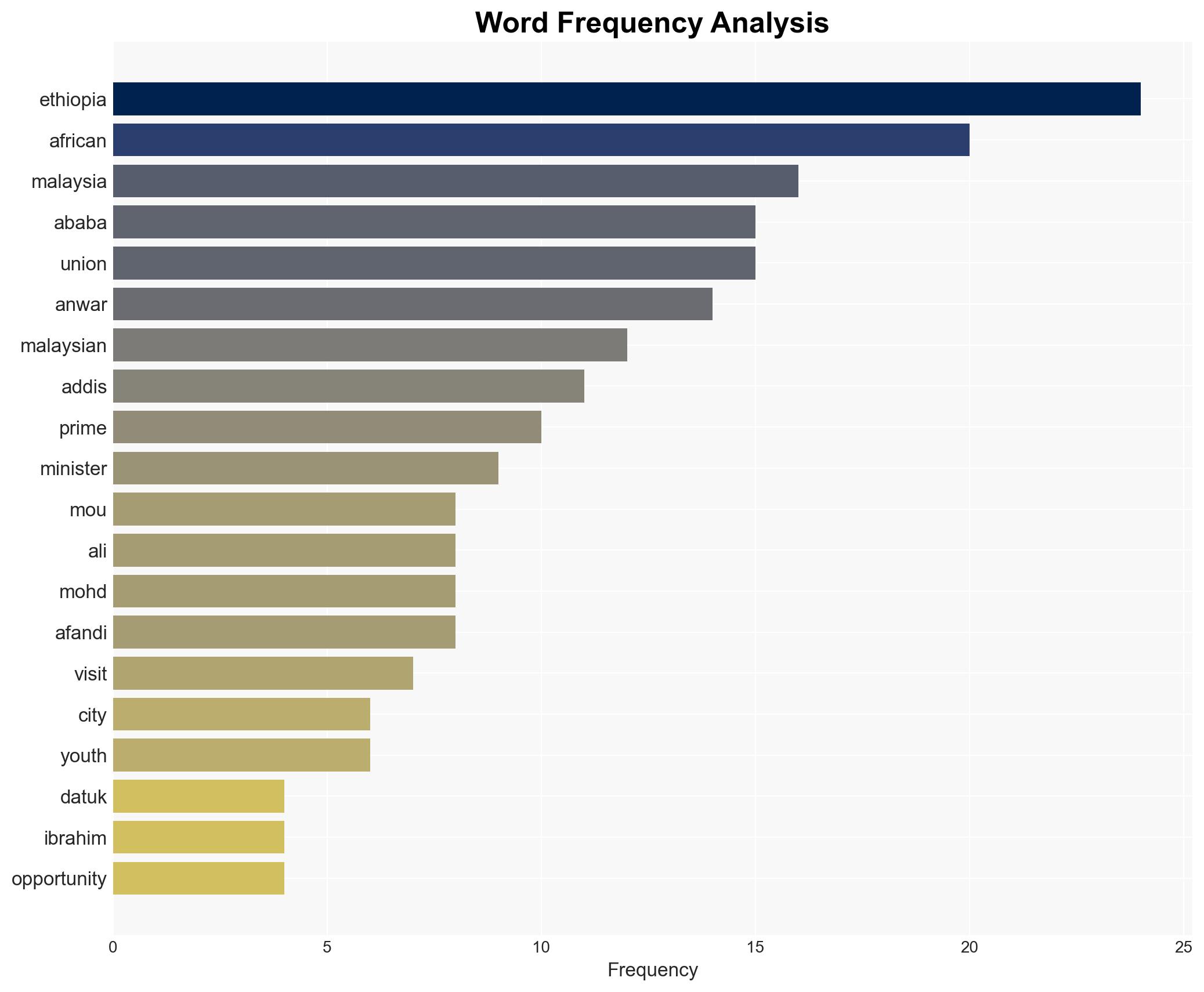PM makes maiden visit to Ethiopia – The Star Online
Published on: 2025-11-18
AI-powered OSINT brief from verified open sources. Automated NLP signal extraction with human verification. See our Methodology and Why WorldWideWatchers.
Intelligence Report:
1. BLUF (Bottom Line Up Front)
The visit by Prime Minister Datuk Seri Anwar Ibrahim to Ethiopia is likely a strategic move to enhance Malaysia’s diplomatic and economic ties with the African continent, particularly through the African Union. The most supported hypothesis is that Malaysia aims to establish a stronger presence in Africa by leveraging economic and diplomatic engagements. Confidence level: Moderate. Recommended action: Malaysia should continue to pursue multi-sectoral engagements and monitor the outcomes of the signed MOUs to ensure tangible benefits.
2. Competing Hypotheses
Hypothesis 1: Malaysia is seeking to expand its influence and economic opportunities in Africa by strengthening bilateral relations with Ethiopia and engaging with the African Union.
Hypothesis 2: The visit is primarily a symbolic gesture to commemorate the 60th anniversary of diplomatic relations with Ethiopia, with limited immediate economic or strategic impact.
Assessment: Hypothesis 1 is more likely given the structured engagements, including MOUs in health, air service, and tourism, and the reopening of the Malaysian embassy in Addis Ababa. These actions suggest a concerted effort to establish a long-term presence and influence in the region.
3. Key Assumptions and Red Flags
Assumptions: It is assumed that Ethiopia and the African Union are receptive to Malaysia’s overtures and that the signed MOUs will be implemented effectively.
Red Flags: Potential overestimation of the immediate economic benefits and underestimation of regional political complexities. The possibility of symbolic gestures overshadowing substantive outcomes.
Deception Indicators: Lack of transparency in the terms of the MOUs or exaggerated claims of potential benefits could indicate a misalignment between stated objectives and actual intentions.
4. Implications and Strategic Risks
The strategic engagement with Ethiopia could lead to increased Malaysian influence in Africa, potentially opening new markets and investment opportunities. However, risks include political instability in the region, challenges in implementing agreements, and competition from other nations with established ties in Africa. Cybersecurity and informational risks could arise if diplomatic communications are not adequately secured.
5. Recommendations and Outlook
- Malaysia should establish a monitoring mechanism to track the progress and outcomes of the MOUs.
- Engage in capacity-building initiatives to strengthen local partnerships and ensure mutual benefits.
- Best-case scenario: Successful implementation of agreements leading to increased trade and investment.
- Worst-case scenario: Diplomatic efforts yield minimal tangible outcomes, and Malaysia’s influence remains limited.
- Most-likely scenario: Gradual improvement in bilateral relations with incremental economic benefits.
6. Key Individuals and Entities
Datuk Seri Anwar Ibrahim, Dr. Abiy Ahmed Ali, Taye Atske Selassie, Mahmoud Ali Youssouf, Mohd Afandi Abu Bakar.
7. Thematic Tags
Regional Focus, Regional Focus: Africa, Malaysia-Ethiopia Relations, African Union Engagement
Structured Analytic Techniques Applied
- Causal Layered Analysis (CLA): Analyze events across surface happenings, systems, worldviews, and myths.
- Cross-Impact Simulation: Model ripple effects across neighboring states, conflicts, or economic dependencies.
- Scenario Generation: Explore divergent futures under varying assumptions to identify plausible paths.
Explore more:
Regional Focus Briefs ·
Daily Summary ·
Support us





